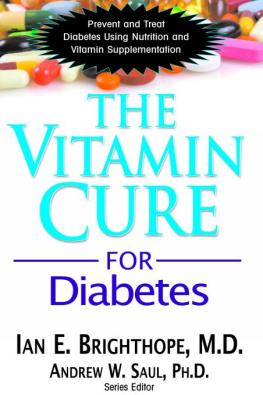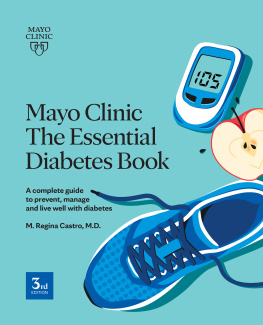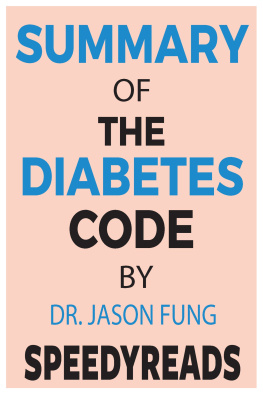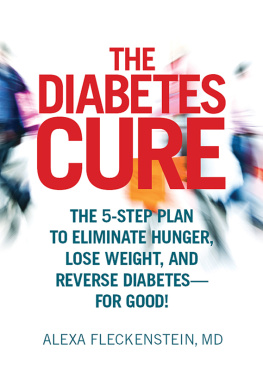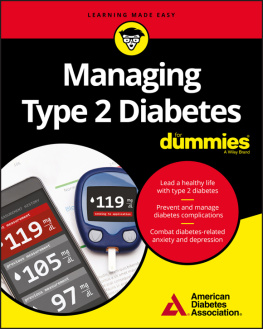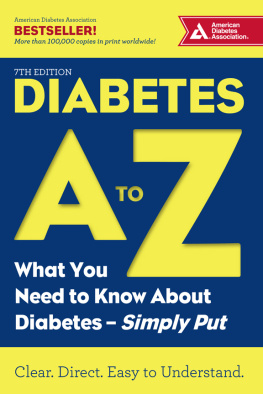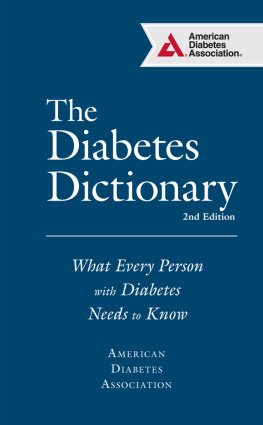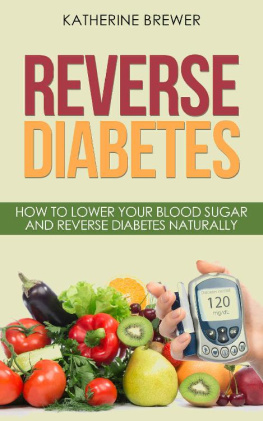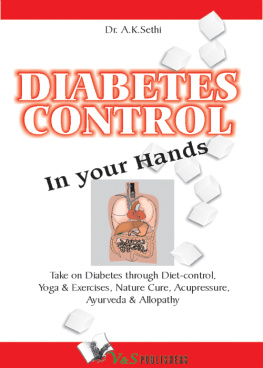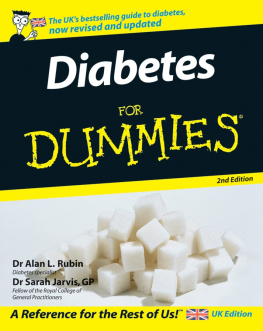Ian E. Brighthope - The Vitamin Cure for Diabetes
Here you can read online Ian E. Brighthope - The Vitamin Cure for Diabetes full text of the book (entire story) in english for free. Download pdf and epub, get meaning, cover and reviews about this ebook. year: 2011, publisher: Basic Health Publications, genre: Home and family. Description of the work, (preface) as well as reviews are available. Best literature library LitArk.com created for fans of good reading and offers a wide selection of genres:
Romance novel
Science fiction
Adventure
Detective
Science
History
Home and family
Prose
Art
Politics
Computer
Non-fiction
Religion
Business
Children
Humor
Choose a favorite category and find really read worthwhile books. Enjoy immersion in the world of imagination, feel the emotions of the characters or learn something new for yourself, make an fascinating discovery.
- Book:The Vitamin Cure for Diabetes
- Author:
- Publisher:Basic Health Publications
- Genre:
- Year:2011
- Rating:5 / 5
- Favourites:Add to favourites
- Your mark:
- 100
- 1
- 2
- 3
- 4
- 5
The Vitamin Cure for Diabetes: summary, description and annotation
We offer to read an annotation, description, summary or preface (depends on what the author of the book "The Vitamin Cure for Diabetes" wrote himself). If you haven't found the necessary information about the book — write in the comments, we will try to find it.
Readers will learn how to optimally manage or even prevent diabetes for themselves and for their loved ones.
The Vitamin Cure for Diabetes — read online for free the complete book (whole text) full work
Below is the text of the book, divided by pages. System saving the place of the last page read, allows you to conveniently read the book "The Vitamin Cure for Diabetes" online for free, without having to search again every time where you left off. Put a bookmark, and you can go to the page where you finished reading at any time.
Font size:
Interval:
Bookmark:
ACKNOWLEDGEMENTS
I would like to thank the following people who supported me while writing this book or provided some of the many references: my PA, Susanne Powell; David Kirk; Charithra Attanayake; David Doolan; George Panagios; Senator Guy Barnett; Andrew W. Saul; Dr. Damien Downing; and all my staff. My special thanks to my wife Jill and our two adult children, Sarah-Jane and Daniel.
AFTERWORD
I t never ceases to amaze me how many beneficial actions nutrients have and how few side effects, if any, there are. Compare this to drugs, which usually have a single action and lists of adverse reactions, some lethal. I am a medical doctor. The statement I just made is not typical of medical doctors. I would like to tell you about myself so that you, the reader of this book, may have a better understanding of the reasons that I have chosen a different path: the practice of nutritional and natural medicine.
Before I studied medicine, I first had earned a degree in Agricultural Science in 1965. For the following three years I was involved in teaching and research. My research interests were in the fields of agricultural science and animal nutrition, including the nutritional health of cattle, horses, sheep, dogs, pigs and poultry. I was also intensely interested in fruit and vegetable production, soil science, and the use and misuse of herbicides and pesticides in food production. I was formulating foods including the addition of micronutrients (vitamins and trace minerals) to improve the fertility, growth rates, performance and productivity of animals.
However, I was extremely disillusioned by the way food for people was being produced, even way back in the 1960s. The proposals by the food industry regarding mass production of more and ever-more highly processed foods containing multitudes of additives shocked me. My grandfather was a brilliant chef. In the early twentieth century, he had cooked in many of the most famous locations in Europe. He always emphasized fresh, whole, clean food be used in the preparation of a meal that we sat down to eat, and always together. No cans or packets of food in his house. He actually introduced olive oil and garlic into some of Australia's top hotels. My grandparents died in their sleep in their late 80s without a day of serious illness.
I became interested in health, had some friends in the medical profession, and decided to do a medical course. In 1969 I entered medical school at the University of New South Wales and completed my clinical studies at Monash University in Victoria, graduating as a physician and surgeon in 1974. I enjoyed the first three years of the course because it was about science; it was during the clinical years that I became concerned about my training to become a doctor.
Patient after patient I was seeing as a medical student were receiving what I was told was the best medical care in the world. Many of them were not really getting any healthier and their illnesses were progressing. The difference between my agricultural science training and my medical training was that nutritional sciences were brought into nearly every aspect of agriculture, from the nutrients in the soil, to the orchard, horticulture, breeding of sheep, production of meat in cattle, productivity of dairy cows, growth rates of pigs. We had only four hours of nutrition in a six year medical course. It doesn't make a lot of sense to know so little about a topic when it's going to be the reason that over ninety percent of your patients are going to die.
A little old lady lying in bed after major surgery for cancer is not regarded as a productive animal. That is unfortunate for her. She receives intravenous sugar, salt and water, is fed overcooked everything, and eats meals including sweets such as ice cream and gelatin desserts. Not a vitamin bottle in sight.
She is obviously malnourished. She is a very interesting case for the professor of medicine and his students. One student requests some information about the lady's diet and nutritional status. The professor retorts that this lady's diet has nothing to do with her current state; now we'll move on to her real problems. By the way, that student was me. That professor's response disgusted me and that was the turning point in my profession. I reflect on the ignorance in my profession, and when I do, I am reminded of that particular professor. I am also reminded about the wonderful training doctors get and how clever they are, that cleverness being matched and in some cases exceeded by their ignorance and arrogance believing that pharmaceutical and surgical medicine is the only true and scientific route to health.
After completing my residency and a year of general medicine and anesthetic practice, I traveled widely throughout Europe, North America and Asia searching for solutions to the problems created by the significant gaps that I had recognized in the normal medical training of doctors. This educational travel included a six month appointment as a ship surgeon, with travel to many parts of the world. This travel and educational process to learn about all forms of medicine and healing has continued throughout my nearly 40 years of practice as a doctor. I specialized in nutritional and environmental medicine with particular interests in cancer, psychiatric illness, auto-immune diseases, diabetes, learning and behavioral disorders, heart disease, psychological disorders related to foods and chemicals, the chronic fatigue syndrome, arthritis, asthma, and food and chemical sensitivities.
For decades, I have been closely involved in the establishment of Integrative Medicine. The intravenous vitamin C clinics that I developed were the first of their kind in Australia. Then, in the early 1980s, I had another life-changing event. A very sick man heard about my intravenous vitamin C clinic. He visited and asked me to treat him. He had full-blown AIDS including the Kaposis' Sarcoma cancer. At the time I saw him, the stage of his disease offered him a life expectancy of a mere 11 months; a very poor prognosis. I will call him Jack.
Jack routinely visited the clinic for treatments which, for the time being were megadoses of intravenous vitamin C, the doses I was successfully using in my cancer and leukemia patients, and mistletoe injections, to stimulate healthy white cells. He discovered that with this treatment he stopped growing new Kaposis cancers, which are dark blue to black lumps on the skin including the face; some of his existing Kaposis had disappeared.
Jack's 11 month prognosis was incorrect. He lived for another 9 years, dying eventually from AIDS-Related Dementia. Nine years beats 11 months any way you look at it. Thus motivated, I wrote and published a book called The AIDS Fighters (Keats Publishing, 1986).
My activities, and this book, provoked some medical professionals to complain to the Medical Board about my using nutrients and high doses of intravenous vitamin C to treat cancer and HIV/AIDS patients. The medical board had decided to hold an enquiry. If I was found guilty of any single charge, they would strike me off and I would never be able to practice medicine again. For someone who came from a background unfamiliar with the medico-legal establishment, this came as a shock; an even bigger shock when there were over 16 charges of infamous conduct in a professional respect. Infamous conduct in a professional respect is the sort of charge the Medical Board reserves for doctors who commit heinous crimes against their patients. None of my patients were harmed, and most lived longer and healthier lives from the type of treatments they received.
I didn't come from a wealthy family; I won a scholarship to medical school and now saw that all my efforts would be in vain if I lost my license to practice. The hearing lasted for four days under a now-reduced charge of professional misconduct (mind you, for publishing scientifically-based works that didn't appeal to some in the medical profession). I was found guilty, reprimanded, and fined $5,000, a lot of money those days. I appealed to the Supreme Court and won. The medical board was severely criticized by the Court and was ordered to pay my costs.
Next pageFont size:
Interval:
Bookmark:
Similar books «The Vitamin Cure for Diabetes»
Look at similar books to The Vitamin Cure for Diabetes. We have selected literature similar in name and meaning in the hope of providing readers with more options to find new, interesting, not yet read works.
Discussion, reviews of the book The Vitamin Cure for Diabetes and just readers' own opinions. Leave your comments, write what you think about the work, its meaning or the main characters. Specify what exactly you liked and what you didn't like, and why you think so.

